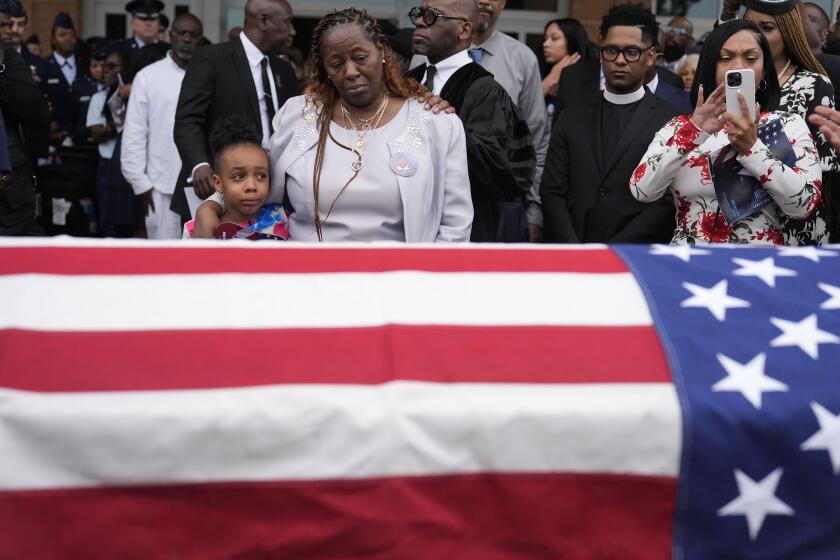Many Russians See Summit as More of a Valley
Once upon a time, good chemistry between the leaders of the United States and Russia and the signing of a sweeping arms accord was all that was needed to bolster the sense of security in the world.
But the issues that stalked Friday’s meeting between President Bush and Russian President Vladimir V. Putin underscored the uneasy feeling that today the world is not necessarily any safer, no matter what is happening between Washington and Moscow.
A few hours after Putin and Bush met to sign the arms accord, a senior Bush administration official was juggling questions not about the number of deployed warheads but about other dangers: Iran’s nuclear program, the threat of terrorist groups acquiring weapons of mass destruction from Russia, and worries about a possible war between nuclear powers Pakistan and India.
And on Moscow’s streets, even the summit’s main proclaimed achievement--the solidifying of trust between the United States and Russia--seemed not to be wholly believed by ordinary people.
Many Russians say the U.S. wants not so much to pursue world peace but to press its advantage, whether the issue is nuclear arms, frozen chickens, Olympic gold medals or rolled steel.
Bush “does a lot for America, but he does it in a way that makes things worse for other countries,” complained Lena Ilyukhina, a 16-year-old interviewed near the hotel where Bush was staying. “He is making America richer, and Russia is getting poorer.”
Her sentiment was reflected in a recent poll by the Public Opinion Foundation here in which 58% of respondents described the U.S. as “unfriendly” toward Russia, while 25% considered it “friendly.”
All in all, the summit seemed to come up far short in the feel-good department compared with meetings between American and Russian leaders in the not-so-distant past.
In part, the atmosphere here was soured even before Bush arrived because of news that the U.S. Senate had refused to take action to repeal what Russians describe as one of the most outdated relics of the Cold War: the Jackson-Vanik Amendment of 1974, which tied access to U.S. trade privileges to the levels of Jewish emigration from the Soviet Union. (The Soviet Union is now gone, and Jewish emigration from Russia is open.)
Several other hoped-for steps by the U.S. to help boost Russia’s economy also did not materialize in the Bush-Putin meetings.
“Ordinary Russians will most likely remain indifferent--they have seen several treaties like that signed since [Soviet leader Leonid I.] Brezhnev’s times, but their daily life has not gotten a tad better,” said Viktor A. Kremenyuk, deputy director of the USA-Canada Institute, a think tank here. “There is nothing in the treaty and all the agreements signed [Friday] that would make an average Russian person say, ‘Wow.’”
But the summit’s lack of drama also can be seen as a good thing, said another analyst, Alexander A. Konovalov, president of the Institute for Strategic Assessment, also a Russian think tank.
“The more routine these meetings get, the better it is,” he said. “There will then be fewer pompous words and more action.”
There was no action on one issue of importance to the U.S.: getting Russia to stop assisting Iran in building a civilian nuclear power plant, which U.S. officials suspect is being used by the Islamic republic as a means to acquire nuclear weapons technology.
In spite of their declared new friendship, Bush and Putin sparred publicly on the issue, with Bush saying Russia was in danger of helping “a nontransparent government run by radical clerics” obtain nuclear weapons, and Putin saying Russia was doing nothing of the kind.
The senior Bush administration official briefing reporters afterward could cite no specific progress by Bush on persuading Russia to back down. He said, however, that the two countries were making progress behind closed doors.
To some Russians, it will probably be a point of pride that Putin did not surrender to the American pressure.
“Putin appears to have shown his mettle and had it his own way; he said no to the Americans on Iran. And maybe this is good,” said Kremenyuk.
“If Russia had continued to make concession after another concession, the U.S. would have finally lost the rest of its respect for Russia,” he said.
On other fronts, the administration official said Russia and the U.S. would be expanding and intensifying their joint efforts to make sure that the thousands of nuclear weapons in Russia do not fall into the hands of terrorists.
And regarding the potential for war between India and Pakistan, both governments were speaking in one voice to try to rein in the South Asian rivals.
The issues showed both the limits, and the potential, of the new U.S.-Russian partnership Bush and Putin are forging.
“The world ... will not be able to sleep peacefully just knowing that the relations between the U.S. and Russia are friendly. Many new challenges have emerged,” said Andrei A. Piontkovsky, director of the Independent Institute for Strategic Studies in Moscow.
“Yet the alliance between the U.S. and Russia,” he added, “also will be extremely instrumental for meeting these new challenges and ensuring global stability.”
*
Times staff writer Maura Reynolds and correspondent Alexei V. Kuznetsov contributed to this report.
More to Read
Start your day right
Sign up for Essential California for news, features and recommendations from the L.A. Times and beyond in your inbox six days a week.
You may occasionally receive promotional content from the Los Angeles Times.






